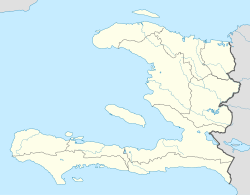Hincha
|
Hinche Ench |
|
|---|---|
| Commune | |
| Nickname(s): La Cité de Charlemagne Peralte The City of Charlemagne Peralte |
|
| Location in Haiti | |
| Coordinates: 19°9′0″N 72°1′0″W / 19.15000°N 72.01667°WCoordinates: 19°9′0″N 72°1′0″W / 19.15000°N 72.01667°W | |
| Country |
|
| Department | Centre |
| Arrondissement | Hinche |
| Founded in | 1704 |
| Government | |
| • Mayor | Jonel Jean-Baptiste |
| Elevation | 228 m (748 ft) |
| Population (7 August 2003) | |
| • Commune | 102,745 |
| • Metro | 50,000 |
| Time zone | Eastern (UTC-5) |
| • Summer (DST) | Eastern (UTC-4) |
Hinche (Haitian Creole: Ench; Spanish: Hincha) is a commune in the Centre department Haiti. It has a population of about 50,000. It is the capital of Centre department. Hinche is the hometown of Charlemagne Péralte, the Haitian nationalist leader who resisted the United States occupation of Haïti (1915-1934).
The island of Hispaniola was discovered by the navigator Christopher Columbus in 1492. The original population of the island, the Tainos, were gradually destroyed by the Spanish conquistadors.
The village of Hincha was founded in 1704, by Spanish settlers from the Canary Islands.
In 1739 its population was of 500 colonists, in 1760 its population reached 3,092 people, of whom 1,443 were slaves; in 1783 its population dropped to 2,993, this decline is explained by the founding of San Rafael de La Angostura and San Miguel de la Atalaya, these cities, located in the Central Plateau, along with San Francisco de Bánica and Dajabón then totaled 18,000 inhabitants (14% of the Spanish colony’s population).
Its economy was primarily focused on the export of beef to the incipient French colony of Saint-Domingue, where the meat was 750% more expensive. In 1743 it had 19,335 livestock (the second largest in the Spanish colony), and in 1772 the number of livestock rose to 30,000 head, the largest one in the colony.
...
Wikipedia

